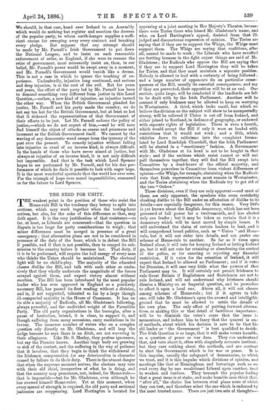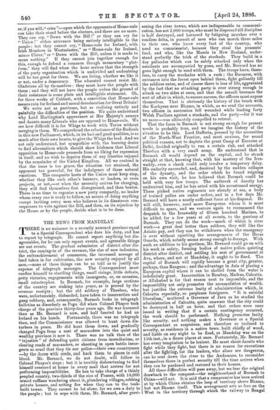THE NEED FOR UNITY.
THE weakest point in the position of those who resist the Home-rule Bill is the tendency they betray to split into sections, which may work together when the testing-hour arrives, but also, for the sake of this difference or that, may drift apart. It is the very justification of that resistance—as far, at least, as Liberals are concerned—that the question in dispute is too large for party considerations to weigh ; that minor differences must be merged in presence of a great emergency ; that alternative plans are not to be considered in presence of the duty of the hour, which is to defeat the Bill if possible, and if that is not possible, then to compel its sub- mission to the country before it becomes law. That duty, if it is to be performed, will require the full energy of every man who thinks the Union should be maintained. The electoral fight will be no child's-play. The majority of the educated classes dislike the Bill, and talk with each other so exclu- sively that they wholly underrate the magnitude of the forces arrayed against them, and expect victory almost without exertion. The Bill has been introduced by the most popular leader who has ever appeared in England as a positively necessary Bill, has passed its first reading without a division, and is, if not supported, tolerated so far by a large though ill-compacted majority in the House of Commons. It has on its side a majority of Radicals, all Mr. Gladstone's following, always powerful, and the undivided weight of the Parnellite Party. The old party organisations in the boroughs, after a pause of hesitation, intend, it is clear, to support it, and though suffering from many secessions, carry resolutions in its favour. The immense number of voters who on a complex question rely directly on Mr. Gladstone, and will leap the hedge because he says there is no ditch, are not wavering in their allegiance. Like Mr. S. Morley, they profess ignorance, but say the Premier knows. Another large body are growing so sick of the contest, and the suffering in the way of patience that it involves, that they begin to think the withdrawal of the Irishmen compensation for any deterioration in character caused by failure to do their duty. There is the utmost danger that when the supreme moment arrives, the electors may vote with their old chief, irrespective of what he is doing, and that the country may pronounce, not, indeed, for Home-rale- that is impossible—but for Mr. Gladstone, even although he has avowed himself Home-ruler. Yet at this moment, when every morsel of strength is required, the old party and sectional jealousies are reappearing. Lord Hartington is berated for
appearing at a joint meeting in Her Majesty's Theatre, because there were Tories there who hissed Mr. Gladstone's name, and who, on Lord Hartington's appeal, desisted from that ill- judged and discourteous expression of opinion. The Tories are saying that if they are to support the Whigs, the Whigs must support them. The Whigs are saying that coalitions, after all, cannot be made to work ; the Liberals who have revolted are fretting because in the fight unjust things are said of Mr. Gladstone ; the Radicals who oppose the Bill are saying that if they are to support Lord Hartington they will be taken for Tories, and that they must maintain a separate position. Nobody is allowed to lead with a certainty of being followed ; and a large number of opponents fix on particular conse- quences of the Bill, usually its essential consequences, and say if they are prevented, their opposition will be at an end. One section, quite large, will be comforted if the landlords are left to be dealt with by the Irish Parliament. Another will be content if only Irishmen may be allowed to keep on worrying in Westminster. A third, which looks small, but which we believe the division on the subject will show to be unexpectedly strong, will be relieved if Ulster is cut off from Ireland, and either joined to Scotland, in defiance of geography, or endowed with separate rights of legislation. There is even a fourth, which would accept the Bill if only it were so loaded with restrictions that it would not work ; and a fifth, which whittles down its criticisms into the complaint formu- lated by Lord Randolph Churchill, that the Irish Parliament will be elected in a " reactionary " fashion. A Government with Mr. Gladstone at its head is not to be fought in that style ; and if the sections which resist cannot or will not pull themselves together, they will find the Bill swept into Committee by a dead-heave of the official majority, and themselves powerless in Committee from violent differences of opinion—the Whigs, for example, abstaining when the Radicals vote that Irish representatives must remain in Westminster, and the Tories abstaining when the Radicals try to get rid of the two " Orders."
These divisions, even if they are only apparent—and most of them are only apparent, the speakers who seem crotchetty cloaking dislike to the Bill under an affectation of dislike to its details—are especially dangerous, for this reason. Very little is yet known about the English democracy, which has not been possessed of full power for a twelvemonth, and has elected only one leader ; but it may be taken as certain that it is a democracy which will be most moved by simple issues. It will understand the claim of certain leaders to lead, and it will comprehend broad politics, such as " Union " and Home- rule, but it will not enter into details, and not prefer one scheme of Home-rule to another. So far as it votes upon Ireland alone, it will vote for keeping Ireland or letting Ireland go, but it will not vote for retaining or abandoning the control of the police, or for enacting or rejecting any financial restriction. If it votes for the retention of Ireland, it will expect that Ireland be allowed no Parliament ; and if it votes for Disunion, it will care very little what the powers of that Parliament may be. It will certainly not permit Irishmen to rule Great Britain if Englishmen and Scotchmen are not to rule Ireland, and will not understand why Irishmen should dismiss a Ministry on an Imperial question, and be powerless to affect it upon a local one. Above all, it will not choose among schemes of Home-rule ; but if it agrees to take one, will take Mr. Gladstone's upon the avowed and intelligible ground that he must be allowed to settle the details of his own plan. The only effect of putting forward alterna- tives, or making this or that detail of factitious importanoe, will be to diminish the voter's sense that the issue is momentous, and induce him to fancy that the quarrel is one of methods, about which his decision is sure to be that his old leader or " the Government " is best qualified to decide. The Irish Question is so large, that it will make voters humble, as a question of peace or war does. They can understand that, and vote about it, often with singularly accurate instinct ; but they care nothing about the methods, and are content to elect the Government which is for war or peace. It is this impulse, usually the safeguard of democracies, to which we trust, and it is this impulse which divisions of opinion, and meetings like that at Birmingham, and lecturings such as we read every day by one recalcitrant Liberal upon another, tend to weaken and confuse. They benumb the popular feeling that a great issue is at stake, and make humble men think that, " after all," the choice lies between rival plans none of which they can test, and therefore select the one which is endorsed by the most trusted name. There are just two sets of thoughts-
or, if you will," cries "—upon which the opponents of Home-rule can take their stand before the electors, and there are no more. They can cry, " Down with the Bill !" or they can cry for " Union !" either utterance being entirely intelligible to the people ; but they cannot cry, " Home-rule for Ireland, with Irish Members in Westminster," or " Home-rule for Ireland, minus Ulster," or " Down with the Bill, unless it is made to mean nothing." If they cannot join together enough for this, enough to defend a common though momentary "plat- form," they will find when the hour arrives that the strength of the party organisation which is undivided and undoubting will be too great for them. We are living, whether we like it or not, under a democracy. The educated cannot resist Mr. Gladstone all by themselves they must have the people with them ; and they will not have the people unless the ground of their resistance is some plain and intelligible statement. Oh, for three weeks of Cobbett, with a conviction that Home-rule means ruin for Ireland and moral deterioration for Great Britain!
We write not as partisans, but as realising entirely and painfully the difficulties of the position. We quite understand why Lord Hartington's appearance at Her Majesty's annoys and daunts many Liberals who are opposed to Home-rule. We see how difficult it is for Whigs to work with Tories without merging in them. We comprehend the reluctance of the Radicals in this new Parliament, which, in its bad and good qualities, is so much after their own hearts, to give the Whigs the lead. And we not only understand, but sympathise with, the burning desire to find alternatives which should show Irishmen that Liberal opposition to Home-rule proceeds from no liking for repression in itself, and no wish to deprive them of any liberties enjoyed by the remainder of the United Kingdom. All we contend is that the issue is too grave, the situation too strained, the opponent too powerful. for the indulgence of these natural emotions. The composite hosts of the Union must keep step, whether they like each other's banners, or leaders, or even projects, or not,—or when the necessity arrives for charging, they will find themselves first disorganised, and then beaten. There is no time to organise a new party compactly, no leader whom every one is ready to follow, no means of doing anything except inviting every man who believes in its disastrous con- sequences to vote against the Bill, and then, on its rejection by the House or by the people, decide what is to be done.



































 Previous page
Previous page